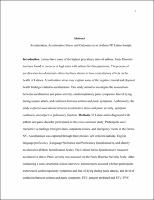Please use this identifier to cite or link to this item:
https://hdl.handle.net/20.500.12202/9036| Title: | Acculturation, acculturative stress, and outcomes in an Asthma-PD Latine sample |
| Authors: | Swencionis, Charles Feldman, Jonathan M. Gonzalez, Jeffrey Interian, Alejandro Steinberg, Dara Castaño, Katerina |
| Keywords: | acculturation acculturative stress ethnic identity Latinos panic severity pulmonary function |
| Issue Date: | 2023 |
| Publisher: | Yeshiva University |
| Citation: | Castaño, K. (2023). Acculturation, acculturative stress, and outcomes in an Asthma-PD Latine sample (Publication No. 30526058) [Doctoral dissertation, Yeshiva University]. PDTG |
| Series/Report no.: | Ferkauf Doctoral Dissertations;Publication No. 30526058 |
| Abstract: | Introduction. Latines have some of the highest prevalence rates of asthma. Panic Disorder has been found to co-occur at high rates with asthma for this population. The process of acculturation to a dominant culture has been shown to have contradictory effects on the health of Latines. Acculturative stress may explain some of the negative mental and physical health findings related to acculturation. This study aimed to investigate the associations between acculturation and panic severity, cardiorespiratory panic symptoms, fear of dying during a panic attack, and confusion between asthma and panic symptoms. Additionally, the study explored associations between acculturative stress and panic severity, symptom confusion, and objective pulmonary function. Methods. 53 Latine adults diagnosed with asthma and panic disorder participated in this cross-sectional study. Participants were recruited via mailings from providers, outpatient clinics, and emergency rooms in the Bronx, NY. Acculturation was captured through three proxies: self-reported nativity, English language proficiency (Language Preference and Proficiency Questionnaire), and identity acculturation (Ethnic Identification Scale). The Cultural Stress Questionnaire measured acculturative stress. Panic severity was assessed via the Panic Disorder Severity Scale. After conducting a semi-structured clinical interview, trained raters assessed whether participants experienced cardiorespiratory symptoms and fear of dying during panic attacks, and level of confusion between asthma and panic symptoms. FEV1 percent predicted and FEV1/FVC scores indicated pulmonary function and were collected via spirometry. Results. Greater identification with mainstream U.S. culture, but not nativity or language proficiency, was associated with greater panic severity (R2change=.130, p=.007) and fear of dying (OR=3.63, 95% CI [1.02, 12.97], p=.047). Greater acculturative stress was associated with less symptom confusion (OR=.049, 95% CI [.003, .856], p=.039) and worse pulmonary function (R2change=.095, p=.023). Conclusion. As hypothesized, greater identification with U.S. mainstream culture was significantly associated with greater panic severity and experiencing fear of dying during a panic attack. Greater acculturative stress was significantly associated with worse pulmonary function and less symptom confusion. Providers who assess and treat Latines with comorbid asthma and panic disorder may target panic severity and pulmonary function by giving greater attention to levels of identity acculturation and acculturative stress. |
| Description: | Doctoral dissertation, PhD / Open Access |
| URI: | https://hdl.handle.net/20.500.12202/9036 https://ezproxy.yu.edu/login?url=https://www.proquest.com/dissertations-theses/acculturation-acculturative-stress-outcomes/docview/2838894193/se-2?accountid=15178 |
| ISBN: | 9798379893279 |
| Appears in Collections: | Ferkauf Graduate School of Psychology: Doctoral Dissertations |
Files in This Item:
| File | Description | Size | Format | |
|---|---|---|---|---|
| Katerina Castano Dissertation_Revisions_Final OA May2023.pdf | 1.05 MB | Adobe PDF |  View/Open |
This item is licensed under a Creative Commons License

